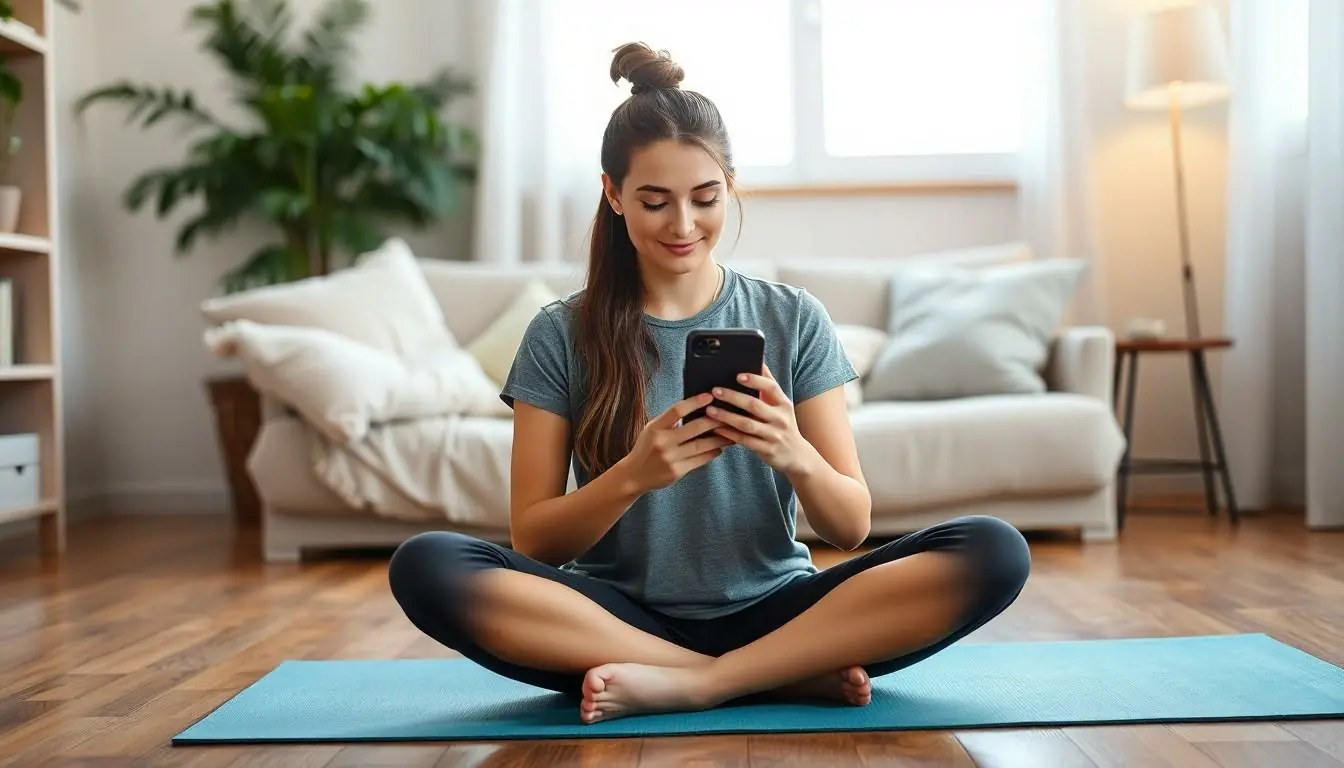Table of Contents
ToggleIn today’s fast-paced world, self-care often takes a backseat to the daily grind. But what if finding a moment for yourself was just a tap away? Enter the realm of free self-care apps that promise to be your pocket-sized therapists, cheerleaders, and yoga instructors—all without charging a dime.
Overview of Free Self Care Apps
Free self-care apps offer easy access to mental and physical wellness tools. These applications cater to diverse needs, including meditation, mood tracking, and guided exercises. Popular options provide daily reminders to encourage regular self-care habits.
Users can engage with meditation apps like Insight Timer or Calm to improve mindfulness. Both provide a range of meditation practices designed for different experience levels. Guided sessions from experienced instructors enhance relaxation and focus.
Mood tracking apps such as Daylio or Moodfit help individuals monitor their emotional well-being. These tools enable users to identify patterns in their feelings, leading to better self-awareness. Knowing triggers fosters proactive responses to stress.
Fitness-related applications like Fitness Buddy and Fitbit help users stay active through guided workouts. Accessing workout routines without a subscription supports a healthy lifestyle. Many of these apps also connect to wearables, allowing for comprehensive health monitoring.
Additionally, platforms like What’s Up and SuperBetter focus on enhancing mental resilience. They employ evidence-based techniques to encourage personal growth and better coping strategies. Users can engage in activities that promote positive thinking and build emotional strength.
In summation, free self-care apps represent a valuable resource for individuals seeking wellness support. This technology makes self-care manageable and accessible for anyone. Each application uniquely addresses specific aspects of mental and physical health, providing a holistic approach to self-care.
Benefits of Using Self Care Apps

Free self-care apps provide numerous benefits that promote overall wellness. They serve as essential tools for enhancing mental health and tracking well-being.
Mental Health Support
Many self-care apps focus on mental health by offering features like guided meditations and mood tracking. Apps such as What’s Up and SuperBetter utilize evidence-based techniques to bolster mental resilience. Users can access coping strategies, stress-relief exercises, and mindfulness practices all in one place. Regular engagement with these apps can alleviate anxiety and improve emotional regulation. Research shows that increased mindfulness contributes to better mental health outcomes. With free options available, individuals can prioritize mental wellness conveniently.
Tracking Well-Being
Tracking emotional and physical health becomes straightforward through self-care apps. Mood tracking applications like Daylio and Moodfit allow users to log their feelings and identify patterns. Fitness apps such as Fitbit provide analytics that encourage an active lifestyle by monitoring physical activities. These insights help users recognize triggers and celebrate progress. In essence, continuous tracking empowers individuals to make informed decisions regarding their mental and physical health. Free access to these tools ensures everyone can manage their well-being effectively.
Top Free Self Care Apps to Explore
Free self-care apps offer a variety of features that promote mental and physical wellness. Here are some top options to consider.
App 1: Overview and Features
Insight Timer provides a robust library of guided meditations. Users find content for sleep, stress relief, and mindfulness, making it easy to tailor sessions to their needs. The app features a community forum that encourages connection and shared experiences. Daily reminders help reinforce mindfulness practices, boosting adherence to routines.
App 2: Overview and Features
Daylio serves as a unique mood tracking app designed to help individuals log their daily feelings. Users select activities that correlate with emotions, allowing for easy pattern identification. The app’s analytics provide insights into emotional trends over time. Simple and visually appealing, Daylio encourages users to maintain regular check-ins for comprehensive self-care.
App 3: Overview and Features
What’s Up focuses on mental resilience by offering coping strategies rooted in Cognitive Behavioral Therapy techniques. Users can track their mood and set personal goals within the app. Features include a customizable dashboard and daily tasks that promote positive thinking. Engaging users in this way fosters a proactive approach to mental wellness.
Tips for Choosing the Right Self Care App
Identify personal goals before selecting a self-care app. Understanding whether the focus is on mental health, physical wellness, or a combination helps narrow the options. Research app functionalities to ensure they align with specific needs.
Explore user reviews and ratings as these provide insight into app effectiveness and usability. Checking recent feedback reveals updates or changes that could impact the user experience. Examine the app’s accessibility features, such as ease of navigation and availability on multiple devices.
Prioritize apps that offer a variety of tools. Apps like Insight Timer include meditations, while others might provide mood tracking or fitness resources. Take note of the design and interface, as a clean layout improves user engagement.
Consider the incorporation of reminders or notifications. Features that prompt regular use enhance the effectiveness of self-care practices. Seek out apps that provide community support, such as forums or groups, which can add a social element to self-care routines.
Evaluate data privacy policies. Ensuring that personal information remains secure builds trust in the app’s services. Lastly, test a few apps before committing to one. Many offer free trials or accessible features, allowing for an informed decision based on personal preferences and practicality.
Free self-care apps are transforming the way individuals approach wellness. With a wealth of resources available at their fingertips, users can easily integrate self-care into their daily routines. These apps not only foster mindfulness and emotional regulation but also promote physical activity and resilience.
By exploring various options, individuals can find tools that resonate with their unique needs and preferences. Whether it’s tracking moods or engaging in guided meditations, the right app can make a significant difference in one’s overall well-being. Embracing these digital resources empowers users to take charge of their health and cultivate a balanced lifestyle.




